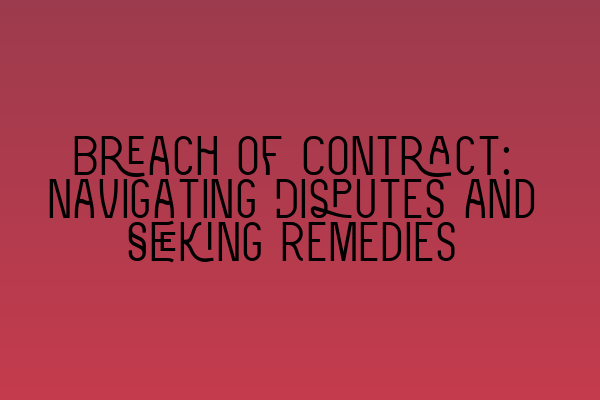Breach of Contract: Navigating Disputes and Seeking Remedies
Introduction
Contract law forms the foundation of business transactions and agreements. Parties enter into contracts with the expectation that each party will fulfill their obligations as outlined in the terms and conditions. However, there are instances when one party fails to meet their contractual obligations, resulting in a breach of contract. In such cases, it is essential to understand how to navigate disputes and seek appropriate remedies. In this article, we will explore the concept of breach of contract, the different types of breaches, and the remedies available to the aggrieved party.
Understanding Breach of Contract
A breach of contract occurs when one party fails to fulfill its obligations as stated in the contract. This failure can be partial or total, ranging from a minor deviation from the agreed terms to a complete failure to perform. Breaches can be categorized into three main types: material, fundamental, and anticipatory.
Material Breach:
A material breach is a significant violation of the terms of the contract. The essential purpose of the contract becomes frustrated due to this breach, and it substantially affects the interests of the non-breaching party. In such cases, the aggrieved party may have the right to terminate the contract and claim damages for any losses suffered.
Fundamental Breach:
A fundamental breach refers to a breach that goes to the core of the contract, undermining its purpose and making it impossible to achieve the intended goals. This type of breach allows the non-breaching party to consider the contract void and seek remedies for the losses incurred.
Anticipatory Breach:
An anticipatory breach occurs when one party communicates its intention not to fulfill its contractual obligations before the actual performance is due. This type of breach can give the non-breaching party the right to terminate the contract and seek remedies for any losses suffered.
Navigating Disputes
When a breach of contract occurs, it is crucial to navigate the dispute effectively to protect your interests. Here are some steps to consider:
1. Review the Contract: Begin by thoroughly reviewing the terms and conditions of the contract to understand the nature of the breach and the rights and remedies available to you. This will ensure that you are well-informed and can make informed decisions.
2. Communication: It is essential to communicate with the breaching party to express your concerns and attempt to resolve the issue through negotiation or alternative dispute resolution methods. Open and honest communication can often lead to a mutually beneficial resolution.
3. Seek Legal Advice: If the breach cannot be resolved through negotiation, it is advisable to seek the guidance of a solicitor experienced in contract law. They can provide you with the necessary legal advice and representation throughout the dispute resolution process.
4. Documentation and Evidence: Maintain meticulous records of all relevant communications, documents, and evidence related to the breach. This will strengthen your case and provide a solid foundation for any legal action that may be required.
5. Alternative Dispute Resolution: Consider alternative dispute resolution methods, such as mediation or arbitration, to resolve the dispute efficiently and cost-effectively. These processes can often result in a quicker resolution without the need for court intervention.
Seeking Remedies
When a breach of contract occurs, the non-breaching party is entitled to seek remedies to compensate for the losses suffered. The most common remedies include:
1. Damages: Damages are the most common form of remedy in breach of contract cases. The purpose of damages is to compensate the non-breaching party for any financial losses incurred as a result of the breach. Damages can be either general or special, depending on the nature of the losses suffered.
2. Specific Performance: In some cases, the non-breaching party may seek an order for specific performance. This remedy requires the breaching party to fulfill their contractual obligations as agreed upon in the contract. Specific performance is commonly sought when the subject matter of the contract is unique or when monetary compensation is inadequate.
3. Rescission: Rescission allows the non-breaching party to treat the contract as void and seek a return to the pre-contractual position. This remedy is typically available in cases where the breach is fundamental or the breaching party engaged in fraudulent or illegal activities.
4. Injunction: An injunction is a court order that prohibits a party from taking certain actions or requires them to fulfill their obligations as specified in the contract. Injunctions are sought when monetary compensation is not sufficient to remedy the breach or prevent further harm.
Conclusion
Breach of contract can be a complicated and distressing situation for the parties involved. Understanding the different types of breaches and the available remedies is crucial for effectively navigating the dispute resolution process. By reviewing the contract, engaging in open communication, seeking legal advice, and considering alternative dispute resolution methods, parties can find a satisfactory resolution to their contractual disputes. Remember to consult a solicitor experienced in contract law to guide you through the process and protect your rights.
Related Articles:
– SQE 1 Practice Exam Questions
– SQE 1 Practice Mocks FLK1 FLK2
– SQE 2 Preparation Courses
– SQE 1 Preparation Courses
– SRA SQE Exam Dates
